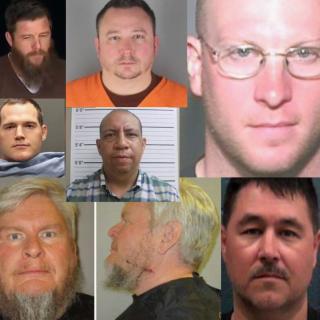Central Ohio’s well-known Leonard Peltier advocate Michael Eckhardt is a Free Press Hero. The Free Press honors Michael this week for his tireless and dedicated work for Leonard Peltier’s freedom.
Finally, on the last day of his presidency, Biden performed a most remarkable act – commuting the sentence of Native American political prisoner Leonard Peltier. NPR reported “vehement opposition” from the FBI, a factor that’s prevented previous presidents from releasing him. Biden added Leonard’s long-awaited commutation to his huge number of pardons and clemency actions. Thousands of activists worldwide, who persistently lobbied the federal government during five decades for Leonard’s release, are relieved and ecstatic. Leonard is now 80 years old and his health is failing.
Michael was involved with the Leonard Peltier Defense Committee (LPDC) as Regional Director, member of the National and International Speakers Bureau, member of the LPDC Advisory Board, and his last position was being appointed a member of the LPDC Executive Council. Michael also represented the national LPDC at the 1995 United Nations Working Group for Indigenous People in Geneva. After that he was given the responsibility for maintenance and oversight of over 100 support groups worldwide.
He has been personally in touch with Leonard and led efforts to free him. Since the 1980s, Michael kept the Free Press updated with news of Leonard’s prison experience, his health, and his accomplishments. Leonard is a prolific and talented artist and writer. The pages of the Free Press included letters from Leonard and articles provided by Michael Eckhardt. Michael wrote this article for the Free Press in May 1995. In part, it reads:
"This summer will mark the 20th anniversary of the shootout at Oglala, in which two FBI agents and one Native American lost their lives. This firefight led to the false incarceration of American Indian Movement member Leonard Peltier. Leonard, now 50 years old, is serving his 19th year of incarceration and sits in a cage in Leavenworth Penitentiary in Kansas. He remains confined for the murders of the two FBI agents on June 26th, 1975. (…)"
"Leonard’s struggle, Indigenous struggle, always comes back to issues, of the land, and the lifeways that respect the land on which the people live. The Big Mountain struggle serves as yet another example. A group of traditional Dine’h from Big Mountain Arizona were passing through Ohio this past summer, on their way to Washington D.C.. They are being forced off their land as you are reading this. (…)"
"The resisters, before leaving for Washington, asked me to take a message to Leonard Peltier. That message was: “Please tell Leonard that he saved us again.” When I asked what that meant, it was expressed, 'When we left our home on Big Mountain 4 days ago, we didn’t know your name or who you were, and here you are taking care of 12 of our people... thank Leonard for that.' Here is a people staring down the gun barrels of the government, about to lose their land, or their lives, and they take the time to honor Leonard for the stance he took 20 years ago, and ever since.”
Michael often spoke at events about Leonard’s case. He organized local activists to participate in a caravan to Washington DC to demand Leonard’s release in June 1994. Michael was present in Geneva, Switzerland in July 1995 when a formal intervention was filed with the United Nations Human Rights Commission through a Working Group for Indigenous Populations. Michael reported that there was overwhelming international concern and support for Leonard. A formal call to action was delivered to the United Nations Secretariat to, among other things, pressure the U.S. to issue executive clemency and freedom for Leonard.
In another Free Press article in 1995, Michael summed up Leonard’s situation: “Leonard Peltier symbolizes all indigenous struggle. The political realities that have kept him incarcerated for so long repress the ideals of Native Peoples. These ideals concern land rights, treaty rights, burial rights, hunting and fishing rights, water rights, mineral rights and the premise of sovereignty among others. After over 500 years of the acquisition of these things, those who challenge these acquired assets are subject to risk. Leonard has paid and continues to pay a very high price for simply defending his people. The case of Leonard Peltier clearly points out the wide difference between the administration of law and the administration of justice that can and does exist when deemed necessary by government officials.”
Pat Marida, a local activist who worked with Michael states, “His house was full of posters and other materials about Leonard and his arrest and his struggle for freedom. He has been truly dedicated to Leonard’s cause.”
The day after Leonard’s commutation announcement, Michael wrote: “I am particularly grateful for every single person who joined in to help free Leonard along the decades. Each second since 1975 has been a new crime by our government against Leonard Peltier and all indigenous people and peoples. They may have addressed or put postage on newsletters, attended meetings or events. Some went to pow-wows or awareness events, rallies in Washington where we held street initiatives, educational forums for the public and Congress. Some participated in non-violent civil disobedience actions. Every act mattered and cumulatively added up to Leonard's release (not until February 18th). So, thanks again, to all who contributed to Leonard's freedom against seemingly insurmountable odds. Leonard is finally going home.”
The Free Press salutes Michael’s commitment to Leonard’s freedom and congratulates him on the victory.



